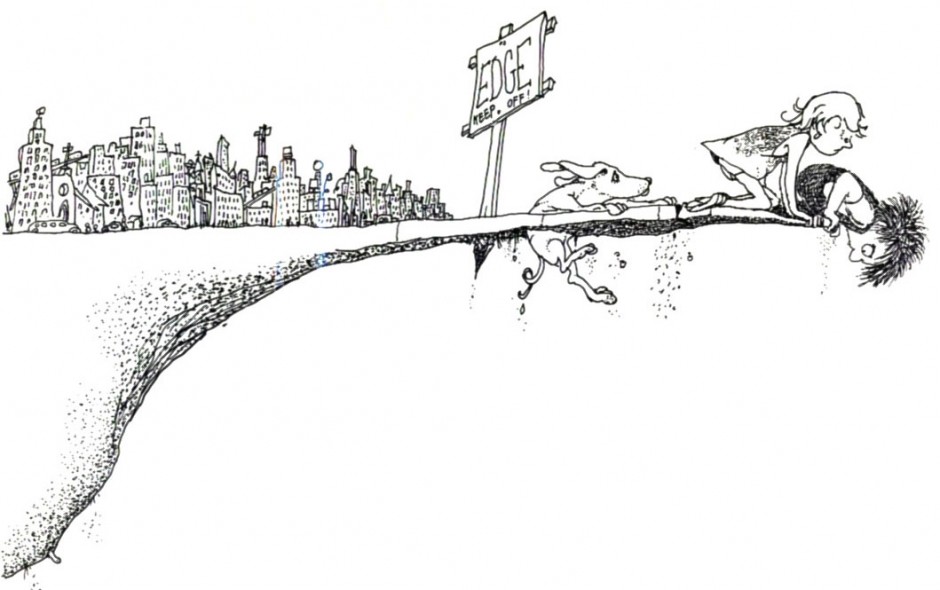Some Other Stuff I Want to Share, Volume I
I’m trying something new here. It’s going to be a running list of stuff that I’ve thinking about but am not otherwise writing about (which is to say, isn’t likely going to be a Now I Know). I’m loosely following a format I used a decade (wow!) ago when I got my start as an erstwhile sportswriter, but I’m not sure how it’s going to totally play out yet. Suffice it to say that this is actually a long time coming — I’ve been thinking about this for a long, long time but haven’t been able to figure out the details, so I’m just going to figure it out as I go along. If you’d like to reply to anything below, or about this idea generally, please let me know. I’d prefer if you sent me a tweet (it’s easiest for me) but email is a good-enough second choice.
Anyway, let’s get on with the show.
* * *

Shel Silverstein was an author and cartoonist some of the world’s greatest children’s books — Where the Sidewalk Ends, A Light in the Attic, and a bunch of other stuff. But he also wrote a lot of non-children’s work, including cartoons for Playboy. He’s an interesting person, but he’ll never write an autobiography — he can’t, because he died in 1999.
But Joseph Thomas, a professor at San Diego State University, wants to write the definitive Shel Silverstein biography. He’s been studying the poet/cartoonists work for years and when you read this article on Slate, you’ll likely find Silverstein as fascinating as Thomas does. Unfortunately, you’ll also learn that Thomas won’t likely be able to publish the biography — because of a really strange unintended consequence of how American copyright law plays out.
Thomas wants to quote Silverstein’s works in his book, which is a mix between “obvious” and “necessary,” given what the former is writing. And legally, he should be able to. I was once a lawyer — that’s my I-can’t-still-give-legal-opinions legal opinion on the matter. It’s most likely fair use, which is described here.
The problem? First, fair use gets argued in front of a judge, and therefore, is an expensive thing to assert — you have to hire lawyers and all that stuff. Second, the fair use analysis is a fickle beast, and there’s always a non-zero chance you’re going to lose — so it can be VERY expensive. And while the universe would probably be better off if Mr. Thomas gets to publish his biography of Mr. Silverstein, well, let’s face it, there’s not a lot of money in it for anyone. The publisher can’t afford to take the risk of having to pay off a bunch of legal bills (if not worse).
Typically, an author and/or publisher will get permission from the rights holder — in this case, Silverstein’s estate — and avoid the legal ambiguities above. But Silverstein’s estate refused to grant these rights. I don’t think there’s anything nefarious going on here, by the way; Silverstein apparently was a big believer in the medium being a large part of the message, and taking his poems and cartoons out of the mediums in which they were published would, in his mind (assuming he were still alive), change them dramatically. So his estate is simply carrying out that wish. Regardless, Thomas therefore can’t find a publisher who will take his work and turn it into a book. Self-publishing isn’t an option for the same reason.
This is a ridiculous outcome, and a serious flaw in American copyright jurisprudence. Fundamentally, the fair use doctrine exists to make sure that copyright doesn’t trump the First Amendment, and to protect discourse and the marketplace of ideas generally. Being able to survive a lawsuit, financially speaking, shouldn’t be a prerequisite.
Read the whole thing at Slate.
* * *
In the U.S., we tend to rate non-profits based on how much of their annual budget goes toward the problem they’re aimed at solving. The video above is 19 minutes long and will have you thinking for at least five times that. Dan Pallotta, the speaker (here’s his Wikipedia entry) makes a few really interesting points arguing that (a) that’s the wrong way to measure what we’re after and (b) other factors limit our ability to solve the large scale problems out there. Worth watching the whole thing.
* * *
Quick hits: This is a ship-shipping ship, shipping shipping ships. … One of the early Now I Know articles I wrote was about how the Earth has a finite amount of helium, and how it’s incredibly underpriced given the scarcity. According to a recent Washington Post article, that’s actually being addressed. … Mental Floss interviews the generally reclusive, incredibly interesting Bill Watterson. If the name isn’t immediately recognizable, he’s the cartoonist who brought Calvin and Hobbes to the world. The interview is a HUGE win for Mental Floss, who has no idea why Watterson picked them. … If you’re a baseball fan, this guy’s attempt to go 9 innings with Mariano Rivera in MLB 13 The Show is a great story. If you don’t know what that means, oh well. … The Dutch have created an “eco-friendly bicycle bus” to transport school children.
Originally published on October 22, 2013